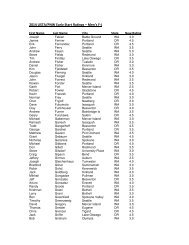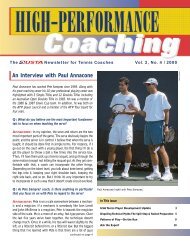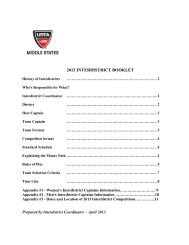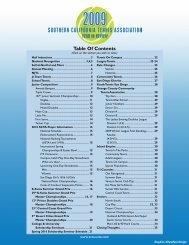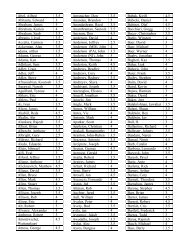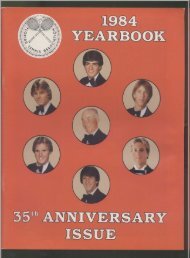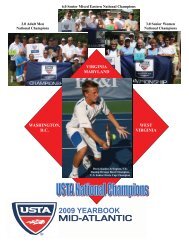- Page 1 and 2:
FRIEND AT COURT 2010
- Page 3 and 4:
FRIEND AT COURT THE USTA HANDBOOK o
- Page 5 and 6:
Foreword The most significant chang
- Page 7 and 8:
USTA Regulations There was a substa
- Page 9 and 10:
Contents Foreword..................
- Page 11 and 12:
E. Net Umpire......................
- Page 13 and 14:
II. Discrimination Complaint and Re
- Page 15 and 16:
FOREWORD The International Tennis F
- Page 17 and 18:
i. After an agreed odd number of ga
- Page 19 and 20:
Additional approved alternative sco
- Page 21 and 22:
USTA Comment 9.1: When should the t
- Page 23 and 24:
USTA Comment 15.1: Do the partners
- Page 25 and 26:
USTA Comment 18.6: When may the rec
- Page 27 and 28:
USTA Comment 23.1: What happens whe
- Page 29 and 30:
USTA Comment 24.4: What happens if
- Page 31 and 32:
lob in doubles and loudly shouts
- Page 33 and 34:
finish that game in the “new” p
- Page 35 and 36:
• If the error is discovered when
- Page 37 and 38:
USTA Comment 29.10: A best-of-five
- Page 39 and 40:
AMENDMENT TO THE RULES OF TENNIS Th
- Page 41 and 42:
of court surface types which confor
- Page 43 and 44:
SCORE IN A SET (Rules 6 and 7): 1.
- Page 45 and 46:
coaching in respect of any Code of
- Page 47 and 48:
5. The Chair Umpire’s final decis
- Page 49 and 50:
6.3 The Chairperson shall be entitl
- Page 51 and 52:
12.3 Such interim Rulings may inclu
- Page 53 and 54:
78'0" 23.77m) PLAN OF THE COURT Not
- Page 55 and 56:
c, d, but the court can be measured
- Page 57 and 58:
PART 2—THE CODE THE PLAYERS’ GU
- Page 59 and 60:
11. Requesting opponent’s help. W
- Page 61 and 62:
30. Delays during service. When the
- Page 63 and 64:
43. New balls for a third set. When
- Page 65 and 66:
FAC Comment I.A-3: The term “Dist
- Page 67 and 68:
USTA Reg. I.C.4. I.H.3. I.H.4. IV.C
- Page 69 and 70:
a. Presence of Referee or Deputy Re
- Page 71 and 72:
3. Short Sets. A tournament electin
- Page 73 and 74:
ii. NTRP Division if the player’s
- Page 75 and 76:
Tournaments starting in 11/10: 18s
- Page 77 and 78:
January 1 Criteria and Procedure. T
- Page 79 and 80:
H. Entry Process 1. Means of entry.
- Page 81 and 82:
FAC Comment I.H-1: Tournaments post
- Page 83 and 84:
II. DRAW REGULATIONS A. Seeding Whi
- Page 85 and 86: • Player in the draw was not seed
- Page 87 and 88: c. Using byes to fill out draw. Whe
- Page 89 and 90: draw starting from the bottom up; d
- Page 91 and 92: quarters, the specific one of these
- Page 93 and 94: conditions as main-draw matches, in
- Page 95 and 96: . To lines opposite seeds if four p
- Page 97 and 98: Modified Curtis Feed-In Championshi
- Page 99 and 100: • The player with the highest per
- Page 101 and 102: FAC Comment II.B-9: The Referee’s
- Page 103 and 104: ii. remake the draw; iii. relocate
- Page 105 and 106: Players Omitted from Draw Fig. 8 US
- Page 107 and 108: 18, is drawn. Edwards’ name is re
- Page 109 and 110: FAC Comment II.C-7: In some cases t
- Page 111 and 112: TABLE 7 Scheduling Guidelines for A
- Page 113 and 114: FAC Comment II.D-3: Tables 6 and 7
- Page 115 and 116: FAC Comment III.B-1: The playing ar
- Page 117 and 118: B. After Entries Close But Before D
- Page 119 and 120: C. Rest Periods 1. Rest between mat
- Page 121 and 122: Wheelchair Family & NTRP Senior Adu
- Page 123 and 124: FAC Comment III.E-3: If a player ha
- Page 125 and 126: TABLE 11 Medical Timeouts, Bleeding
- Page 127 and 128: F. Toilet/Change of Attire Break A
- Page 129 and 130: IV. PLAYER RESPONSIBILITIES AND CON
- Page 131 and 132: Coaching is permitted during an aut
- Page 133 and 134: 18. Player shall not engage in gamb
- Page 135: Code Violations Delay • Not resum
- Page 139 and 140: Verbal or Physical Abuse( Cont’d)
- Page 141 and 142: FAC Comment IV.D-9: Player A is pen
- Page 143 and 144: Referee who issued the default, in
- Page 145 and 146: eport the suspension to the USTA Na
- Page 147 and 148: 6. Results not considered for ranki
- Page 149 and 150: mesh so that a ball cannot pass thr
- Page 151 and 152: FAC Comment VII.A-4: May the Refere
- Page 153 and 154: determined. Examples include determ
- Page 155 and 156: of the opponent, then the name of t
- Page 157 and 158: 7. Four characteristics mark the de
- Page 159 and 160: The tiebreak score is reported as 7
- Page 161 and 162: as much of the scorecard as possibl
- Page 163 and 164: FAC Comment VII.C-13: Player A hits
- Page 165 and 166: sight along the top of the band. Th
- Page 167 and 168: all. Maintain ready position throug
- Page 169 and 170: 4. Call foot faults, remembering th
- Page 171 and 172: 4. Number of tournaments. Every yea
- Page 173 and 174: . National Chair Umpire: i. Shall h
- Page 175 and 176: 1. Life Umpire: An official who has
- Page 177 and 178: Regulation VI.B.3. (QuickStart Tenn
- Page 179 and 180: d. ITF tournaments on National Juni
- Page 181 and 182: TABLE 16 Seeding Criteria for USTA
- Page 183 and 184: Entry into USTA National Championsh
- Page 185 and 186: ecord calculated as of the effectiv
- Page 187 and 188:
or is otherwise removed from the dr
- Page 189 and 190:
eason from the player’s final sch
- Page 191 and 192:
TABLE 18 2010 USTA International To
- Page 193 and 194:
FAC Comment IX.A-9: The standard by
- Page 195 and 196:
Defaults* Code Violations Improper
- Page 197 and 198:
any appeal shall be barred unless i
- Page 199 and 200:
• Code violations under the Point
- Page 201 and 202:
X. ADULT, SENIOR AND FAMILY NATIONA
- Page 203 and 204:
d. Match formats. All matches playe
- Page 205 and 206:
• Aliens with Asylee Status. Alie
- Page 207 and 208:
i. The order in which their names a
- Page 209 and 210:
7. Calculating rankings in Adult an
- Page 211 and 212:
the Adult/Senior and Family Ranking
- Page 213 and 214:
XII. COLLEGIATE AND SCHOLASTIC TOUR
- Page 215 and 216:
XIII. WHEELCHAIR NATIONAL TOURNAMEN
- Page 217 and 218:
Computerized List Method described
- Page 219 and 220:
• Category I USTA National Wheelc
- Page 221 and 222:
FAC Comment XIII.B.2: If the Men’
- Page 223 and 224:
XV. USTA LEAGUE A. Description The
- Page 225 and 226:
XVII. SANCTIONING A. General Inform
- Page 227 and 228:
although for clarity, the word “O
- Page 229 and 230:
c. Submission to appropriate compet
- Page 231 and 232:
Championships, as set forth in USTA
- Page 233 and 234:
3. Tennis camp and school scholarsh
- Page 235 and 236:
3. Lost income. Lost opportunities
- Page 237 and 238:
3. Consequences of violating USTA R
- Page 239 and 240:
XIX. AMENDMENTS AND REQUESTS FOR WA
- Page 241 and 242:
• State the period over which the
- Page 243 and 244:
• Gloves: Verify that exam gloves
- Page 245 and 246:
sport drinks (e.g., Gatorade). Thes
- Page 247 and 248:
PART 5—UMPIRE ASSIGNMENT, SELECTI
- Page 249 and 250:
6. The USTA maintains records of th
- Page 251 and 252:
PART 6—UMPIRE AWARDS John T. McGo
- Page 253 and 254:
Nicholas E. Powel Award Recipients
- Page 255 and 256:
SUMMARY OF IMPORTANT ITA CHANGES FO
- Page 257 and 258:
I. INDIVIDUAL COMPETITION—SINGLES
- Page 259 and 260:
19. Player who has been overruled t
- Page 261 and 262:
5. ITA Carry-Over Rules. The follow
- Page 263 and 264:
13. Spitting. Spitting at or in the
- Page 265 and 266:
I. Rest Periods, Continuous Play, a
- Page 267 and 268:
all. The Referee shall make this de
- Page 269 and 270:
3. Matches between schools from dif
- Page 271 and 272:
defaults for ranking purposes. 15.
- Page 273 and 274:
services of a qualified trainer, pr
- Page 275 and 276:
different time is agreed upon by bo
- Page 277 and 278:
line-up as presented is unfair, he
- Page 279 and 280:
coaches are current ITA members, an
- Page 281 and 282:
PART 8—GLOSSARY 7-Point Set Tiebr
- Page 283 and 284:
Compass Draw. This is a non-elimina
- Page 285 and 286:
ITF Tournaments on the National Jun
- Page 287 and 288:
Permanent Fixtures. Permanent fixtu
- Page 289 and 290:
Senior Divisions. The Men’s and W
- Page 291 and 292:
USTA Regional Tournaments. The Yout
- Page 293 and 294:
Back Draw .........................
- Page 295 and 296:
Category I USTA National Championsh
- Page 297 and 298:
Combined Ranking ..................
- Page 299 and 300:
Omitted players....................
- Page 301 and 302:
Inclement Weather..................
- Page 303 and 304:
National Championship Regulations A
- Page 305 and 306:
Points Played in good faith .......
- Page 307 and 308:
Collegiate Rankings................
- Page 309 and 310:
Presence Required..................
- Page 311 and 312:
Seed...............................
- Page 313 and 314:
Stalling ..........................
- Page 315 and 316:
Tournament Amateur.................
- Page 317 and 318:
USTA National Opens (Juniors) .....
- Page 319 and 320:
The Official’s Code of Conduct A



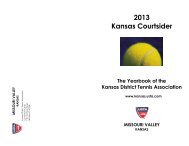

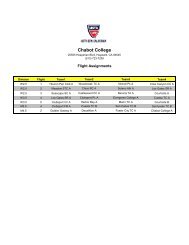

![COMPLETE - 2013 Tournament Schedule [11_20_12] - USTA.com](https://img.yumpu.com/21906454/1/190x245/complete-2013-tournament-schedule-11-20-12-ustacom.jpg?quality=85)


